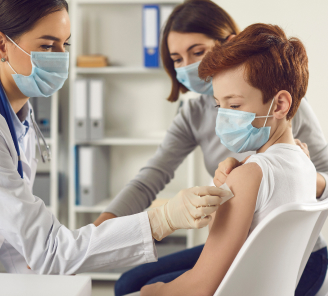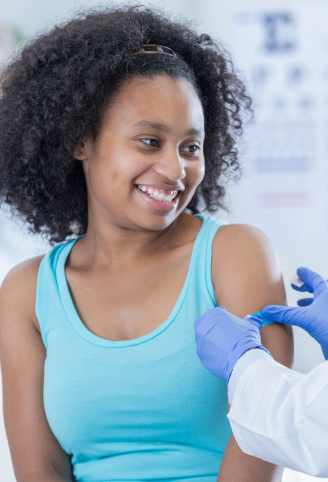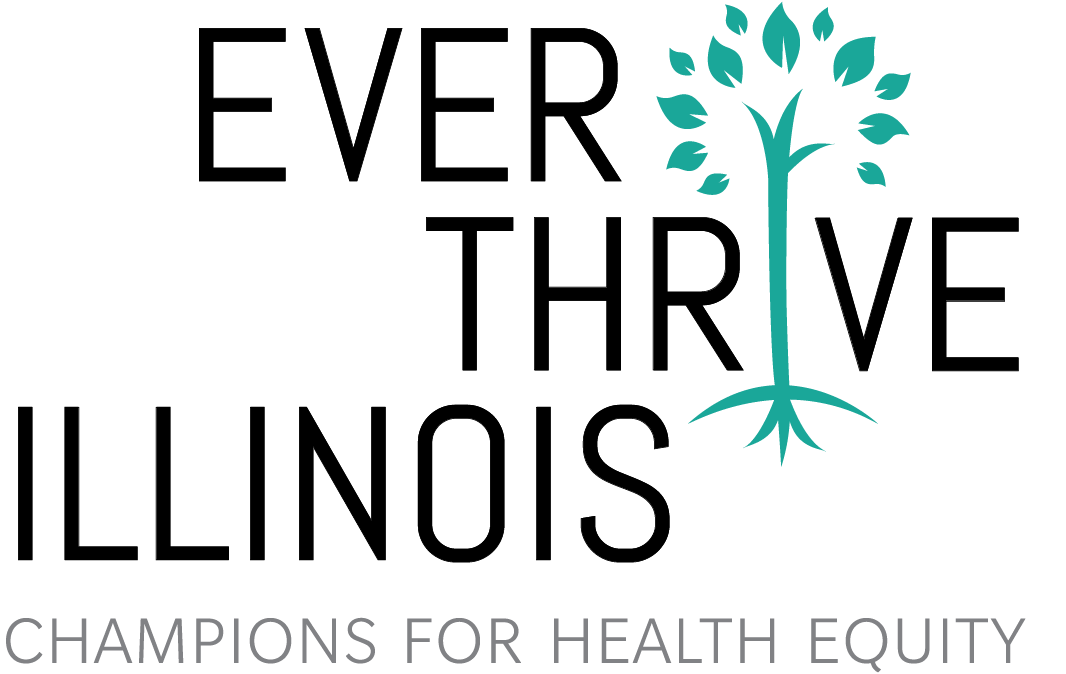Don’t know what to ask? No worries, here are some questions that can help you start a conversation. For more information, view the resources below.
As a result of COVID-19, many teens have missed check-ups and recommended vaccinations.
Vaccines are still the safest, easiest-to-get, and lowest-cost way to prevent some diseases. Vaccines help the immune system recognize and learn to fight serious diseases. It is not too late to get caught up.
As a young adult, you can speak up and stand up for what matters most, your health included. Vaccines are universally recommended for all teens and young adults, ages 11 to 18. So, what can you do next?
Catch Up on Recommended Vaccinations Today
Making choices about your health includes getting educated about diseases and vaccines.
Vaccines boost your immune system and provide you long-term protection from potentially deadly illnesses and infections.
Vaccines are not just for children. They can protect teens from 14 deadly diseases like HPV, Meningococcal Disease, Influenza, and Whooping Cough.

Vaccines are as important as eating healthy, resting, and being physically active.
The National Foundation for Infectious Diseases found vaccines to be in the top 10 medical achievements of the 20th century because of the many lives saved.
There is always room to learn more. To begin exploring health options, talk to your parents. Let them know how much you care about your health.
Be curious. By taking a step forward to understand the benefits of vaccines, you can have a voice in your health decisions.
Be knowledgeable. Vaccines are made with the ingredients they need to be as safe and effective as possible. Therefore, the vaccine will not give you the disease; they are designed to prevent it.
Be true to your point of view. Increase your awareness of vaccines to help you be confident when taking next steps.

Having questions about vaccines and their importance is normal. Having answers to your questions will be the key to making better choices and advocating for yourself.
Ask questions to your school’s social worker, counselor, nurse, or science or biology teacher.
Have an open mind and start a conversation with your parents.
The Internet, your friends, coaches, YouTubers, Tik-Tokers, or other influencers could be helpful sources for you to learn more. When doing your research, find out:
1) Is the person sharing the information a health expert qualified to speak about the topic?
2) Is the purpose of the source you are considering dedicated to providing accurate health education?
3) Does the source provide other links and information for you to verify its truth?
Finances should not force you to choose between buying food, paying rent, or ensuring your children's health and wellbeing. There are programs that can alleviate some of the financial burden and help prevent the high costs of treating preventable illnesses.
If you and your family are enrolled in Medicaid, or if you are uninsured or underinsured, the Vaccines for Children (VFC) program provides vaccines to eligible children at no cost. Ask your child’s doctor or nurse to see if they are a VFC provider.
Your family may also qualify for the Children's Health Insurance Program (CHIP) which covers many childhood vaccines.
Local pharmacies may also have discount programs, like GoodRx, which offer many vaccine discounts.
Local health departments and community health centers may also offer low-cost vaccinations.

Frequently Asked Questions
- Are vaccines safe?
- What are the side effects of vaccines?
- What do vaccines do?
- What vaccines do I need?
- Why should I get vaccinated?
- What are some illnesses that vaccines help prevent?
We Are Here For You
If are still making a decision right now, stop and ask yourself: of the two available options - getting vaccines or not - which one do I want to remember as an essential part of this season of my life and the story of my family? Make it the one that you’re proud to share and talk about.
- 1006 S Michigan Avenue, Suite 200
Chicago, IL 60605 - Phone: 312.491.8161
- Fax: 312.491.8171
- Email: info@everthriveil.org
- Web: https://www.everthriveil.org/
Resources in Illinois
1. Find a Vaccine Provider in Illinois
2. Vaccine Schedule for Ages 7 – 18
3. Illinois Department of Public Health
4. National Vaccine Information Center
Local Area Resources
1. Find a Covid-19 vaccine provider:
2. Immunization Information for Children
- 1006 S Michigan Avenue, Suite 200
Chicago, IL 60605 - Phone: 312.491.8161
- Fax: 312.491.8171
- Email: info@everthriveil.org
- Web: https://www.everthriveil.org/
Disclaimer: We are frequently reviewing and updating this information to reflect the most current data available and provided by subject matter experts on the topic of immunization. Last updated: 6/15/21

